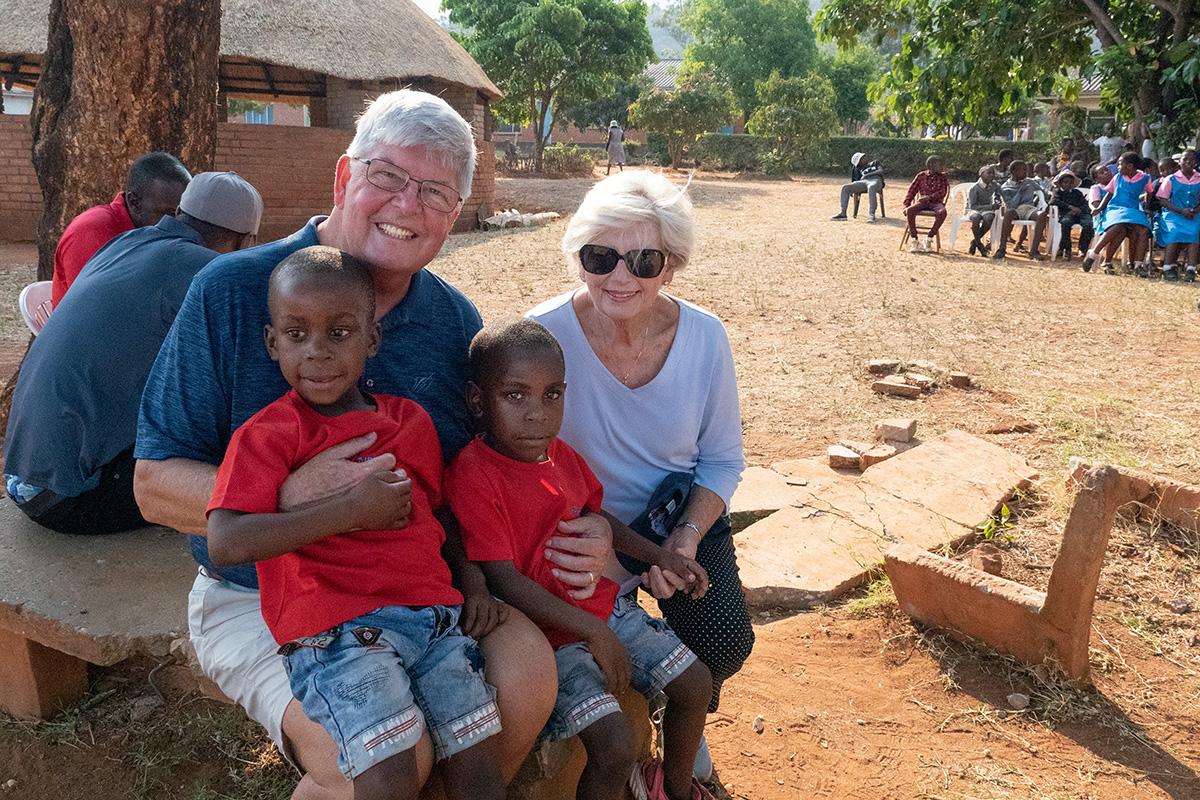Key points:
- Charles and Carol Moore, members of the Baltimore-Washington Conference, sponsor the boys through the Fairfield Outreach and Sponsor Association.
- The boys were left at Fairfield Children’s Home as infants.
- “These two boys are symbolic of the United Methodist connection. They are a very true blessing to us,” Charles Moore said.
Charles and Carol Moore count 5-year-old twins living in the Fairfield Children’s Home at Old Mutare Mission as two of God’s many blessings in their lives.
The two boys, Blessed and Blessing, dressed in bright red T-shirts, sat on Charles’ knees during a special service at the children’s home when the United Methodist South Carolina Conference presented a gift of $800,029 to Fairfield.
The Moores, members of the Baltimore-Washington Conference, sponsor the boys through the Fairfield Outreach and Sponsor Association.
Sponsorship is $30 a month per child, and each child needs three sponsors to pay for food, housing, school fees and uniforms, health care and other expenses. The funds also go to cover the salaries for the “mothers,” educators, workers and other staff who care for the children.
Charles Moore first visited Fairfield in 2006 when he led a volunteer team to the Old Mutare Mission. The mission is across the valley from United Methodist-related Africa University and is part of the property owned by The United Methodist Church in Zimbabwe.
“Blessed and Blessing were left at the orphanage as infants, and there is really no way to know their exact age,” he said. The boys are in early childhood development classes now, and Nyasha Grace Mawoyo, their housemother, says they are doing very well, Charles said.

Charles leads mission teams to the region two to three times a year. On one of those visits, he met the boys.
Carol said she knew sponsoring the two “was a done deal” when someone sent her a picture of Charles with them.
“They had ice cream dripping down their faces, and I knew they had just captured his heart,” she said. “It is wonderful to see how they have grown and blossomed. We have made an impact in their lives that changed them forever.”
Charles said the boys come running across the campus when they see him now.
“Being able to play a part in their lives is very meaningful,” Charles said. “These two boys are symbolic of the United Methodist connection. They are a very true blessing to us.”
The Rev. Juliet Mwarumba, administrator of the Fairfield Children’s Home, gave a report to visitors on the home.
“There are 58 children — 27 boys and 31 girls — currently being cared for at the home. Only 36 are living here at the moment,” she said. “Others are in boarding schools.”
The campus has a garden, and the children help raise chickens. “We have cabbages and tomatoes and some chickens for sale,” she told the group.
Smiling children surrounded the big red and white tent to witness the presentation of the gift.
“The children pray for you to live a long life,” Mwarumba told the many donors who contribute money to the home and to Africa University.
“So, when you reach 100 years old,” she said, smiling, “you will know it was our prayers that helped you.”
Back to main story, Love of children brings $800,000 gift to Zimbabwe
Gilbert is a freelance writer in Nashville, Tennessee.
News media contact: Julie Dwyer, news editor, [email protected] or 615-742-5469. To read more United Methodist News, subscribe to Free Daily or Weekly Digests.




